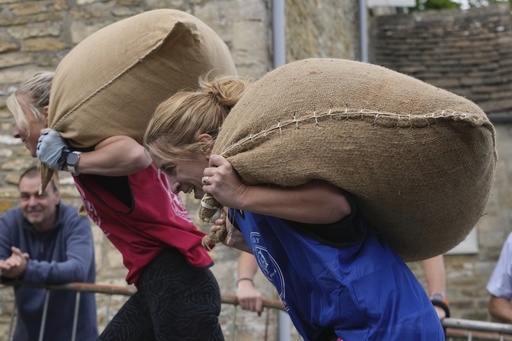LONDON (AP) — Dairy-loving daredevils threw caution to the wind Monday for one of Britain’s most extreme annual events: Cheese rolling.
Cheered by several thousand spectators, scores of reckless racers chased 7-pound (3 kilogram) wheels of Double Gloucester cheese down the near-vertical Cooper’s Hill, near Gloucester in southwest England. The first racer to finish behind the fast-rolling cheese in each race gets to keep it.
The races have been held at Cooper’s Hill, about 100 miles (160 kilometers) west of London, since at least 1826, and the sport of cheese-rolling is believed to be much older.
The rough-and-tumble event often comes with safety concerns. Few competitors manage to stay on their feet all the way down the 200-yard (180 meter) hill.
This year’s hill was especially slippery and muddy after recent rain. Members of a local rugby club lined up at the bottom to catch the tumbling competitors.
Tom Kopke from Munich, Germany won one of the three men’s races. He said attitude was more important than technique.
“You start and then the adrenaline takes over and you just go, go go,” Kopke said.
“Look at this event, look at this hill,” added the muddy, breathless winner. “England is mad. I love it.”
Local competitor Josh Shepherd and Dylan Twiss from Perth, Australia won the other two men’s downhill races. Abby Lampe from North Carolina triumphed in the women’s race with a lighting-fast roll that left the rest of the field far behind.
“You just have to roll,” said Lampe, a graduate of NC State who also won in 2022. “There’s a little bit of pain, but it’s just going to be temporary.”
Dozens of children and adults also competed in safer and slower, but no less grueling, uphill versions of the race, which are traditionally held on a late-May national holiday.
About 20 miles (32 kilometers) away in the town of Tetbury, competitors carried sacks of wool weighing up to 60 pounds (27 kilograms) over a 240-yard (220-meter) course up and down steep Gumstool Hill.
The Tetbury Woolsack Races have been held since 1972, drawing on a local tradition dating back to the 17th century in the historic wool-trading town.



